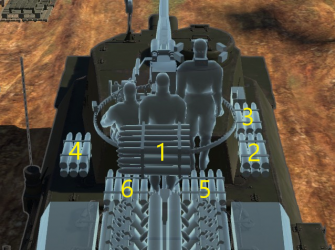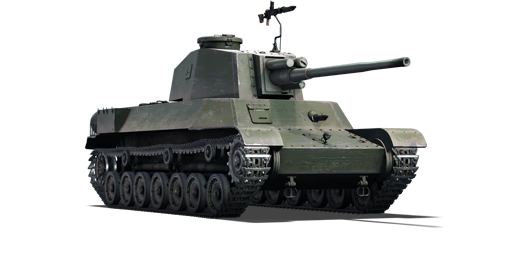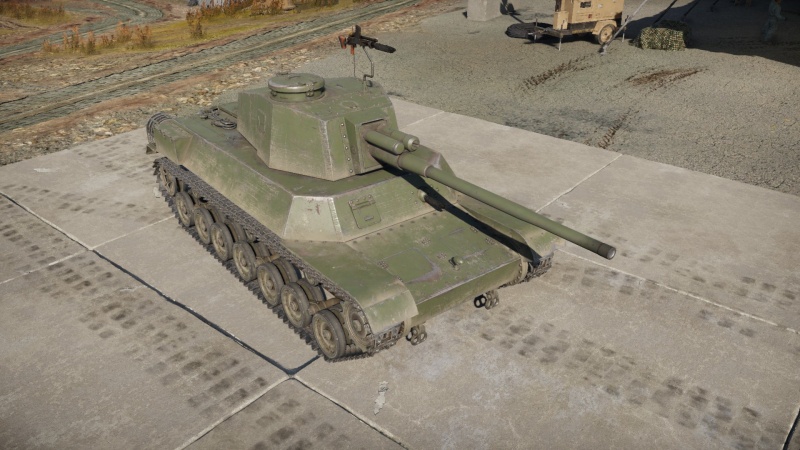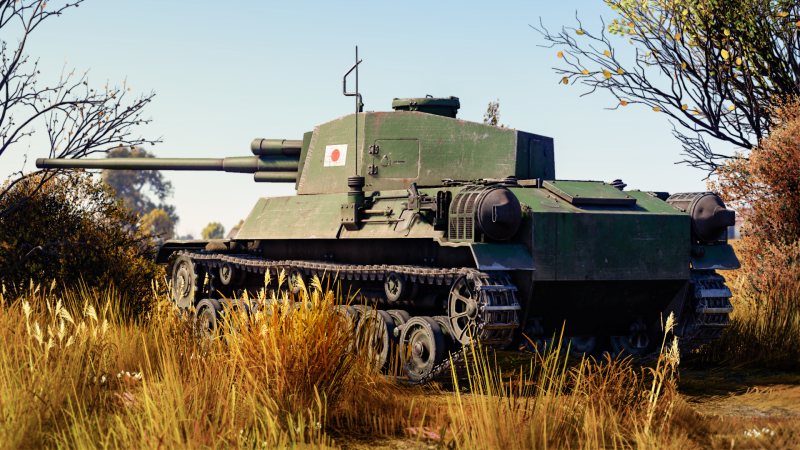Chi-To Late
| This page is about the Japanese medium tank Chi-To Late. For the early version, see Chi-To. |
Contents
Description
The Type 4 Chi-To Late (四式中戦車 「チト」量産型) was the final design of the Chi-To and the proposed production model, having a more streamlined turret design easing production, the armour is also slightly more angled giving it more effective armour than its initial design. However, like its prototype, production was delayed for too long due to material shortages, factory bombings, and ultimately the end of the war.
It was introduced in Update 1.69 "Regia Aeronautica". Compared to its previous design before it, the Chi-To late is slightly more forgiving due to armour effectiveness, able to shrug off shells slightly more often with the same deadly cannon as the Chi-To. It is still advised to keep the Chi-To Late at a long sniper distance, offering the high velocity and deadly 75 mm cannon would be a shame to lose in the frontline.
General info
Survivability and armour
Armour is as good as Japanese medium tanks will get. It can bounce most guns of Rank III and below if you angle your armour well enough (~35-45º), but long-barrelled guns (such as those mentioned above) will have no trouble getting through you.
Armour type:
- Rolled homogeneous armour
- Cast homogeneous armour (Gun mantlet)
| Armour | Front | Sides | Rear | Roof |
|---|---|---|---|---|
| Hull | 75 mm (36°) Front plate 20 mm (77°) Front glacis 20-75 mm (15-57°) Lower glacis 50 mm (31°) Hull cheeks |
35 mm (30°) Top 35 mm Bottom |
35 mm | 20 mm |
| Turret | 75 mm (16°) Turret front 50 mm (11°) Gun mantlet |
50 mm (9°) | 50 mm (1°) | 20 mm |
| Cupola | 75 mm | 75 mm | 75 mm | 20 mm |
Notes:
- Suspension wheels are 15 mm thick while tracks are 20 mm thick.
- Belly armour is 20 mm thick.
- Small bars of RHA exist around the lower side hull, giving an extra 10 mm at their locations.
Mobility
| Game Mode | Max Speed (km/h) | Weight (tons) | Engine power (horsepower) | Power-to-weight ratio (hp/ton) | |||
|---|---|---|---|---|---|---|---|
| Forward | Reverse | Stock | Upgraded | Stock | Upgraded | ||
| Arcade | Expression error: Unexpected * operator. | 620 | Expression error: Unexpected round operator. | __.__ | |||
| Realistic | 354 | Expression error: Unexpected round operator. | __.__ | ||||
The mobility of the Chi-To Late is decent. It will get you to where you need reasonably quickly, and the top speed is respectable. The turning speed and acceleration leaves much to be desired, but isn't terrible overall.
Modifications and economy
Armaments
Main armament
The 7.5 cm Tank Gun Type II Model II performs very well at this BR, and there are seldom any targets that can bounce the Type 4 Kou APHE shell from the front of their armour. It also has decent reloading and great explosive filler, meaning that shots that penetrate will either inflict heavy damage or result in a knock-out.
| 75 mm Type II Model II | Turret rotation speed (°/s) | Reloading rate (seconds) | |||||||||||
|---|---|---|---|---|---|---|---|---|---|---|---|---|---|
| Mode | Capacity | Vertical | Horizontal | Stabilizer | Stock | Upgraded | Full | Expert | Aced | Stock | Full | Expert | Aced |
| Arcade | 55 | -10°/+20° | ±180° | N/A | 12.1 | 16.7 | 20.3 | 22.5 | 23.9 | 8.45 | 7.48 | 6.89 | 6.50 |
| Realistic | 7.6 | 8.9 | 10.8 | 11.9 | 12.7 | ||||||||
Ammunition
| Penetration statistics | |||||||
|---|---|---|---|---|---|---|---|
| Ammunition | Type of warhead |
Penetration @ 0° Angle of Attack (mm) | |||||
| 10 m | 100 m | 500 m | 1,000 m | 1,500 m | 2,000 m | ||
| Type 1 APHE | APHE | 149 | 146 | 133 | 118 | 105 | 93 |
| Type 4 Kou | APHE | 151 | 148 | 137 | 124 | 112 | 101 |
| Type 90 HE | HE | 17 | 17 | 15 | 14 | 12 | 11 |
| Shell details | ||||||||||||
|---|---|---|---|---|---|---|---|---|---|---|---|---|
| Ammunition | Type of warhead |
Velocity (m/s) |
Projectile mass (kg) |
Fuse delay (m) |
Fuse sensitivity (mm) |
Explosive mass (TNT equivalent) (g) |
Ricochet | |||||
| 0% | 50% | 100% | ||||||||||
| Type 1 APHE | APHE | 865 | 6.56 | 1.3 | 15 | 84.8 | 47° | 60° | 65° | |||
| Type 4 Kou | APHE | 865 | 6.75 | 1.2 | 14 | 80.64 | 47° | 60° | 65° | |||
| Type 90 HE | HE | 830 | 6.17 | 0.2 | 0.1 | 490 | 79° | 80° | 81° | |||
Ammo racks

| Full ammo |
1st rack empty |
2nd rack empty |
3rd rack empty |
4th rack empty |
5th rack empty |
6th rack empty |
Visual discrepancy |
|---|---|---|---|---|---|---|---|
| 55 | 41 (+14) | 35 (+20) | 29 (+26) | 23 (+32) | 11 (+44) | 1 (+54) | No |
Note:
- Turret and sides empty: 23 (+32) shells.
Machine guns
| 7.7 mm Type 97 | ||||
|---|---|---|---|---|
| Mount | Capacity (Belt) | Fire rate | Vertical | Horizontal |
| Pintle | 1,000 (20) | 499 | -10°/+70° | ±60° |
| Hull | 3,000 (20) | 499 | ±8° | ±8° |
Usage in battles
As previously stated, the Chi-To Late best performs in the role of sniper, engaging hulldown at medium to long range against opposing medium tanks. The good gun depression, average mobility, and good reverse speed allow you to make it to good positions at an average pace and allow you to reverse back into cover when reloading.
Against most heavies such as the IS-1/2, Tiger, or Panther, it is only worthwhile to engage if you are already entrenched in a solid defensive position. Your gun's lack of APCBC gives you poor performance against slopes and rounded armour on the IS, Panther, and angled Tigers, making any ranged engagement near useless. Against tanks such as the Jumbo 75 or 76, it is best to disengage and flank them or have teammates flank them. Against all other medium tanks, shots to the hull will suffice at most range.
The M4A3E2 Jumbo could be a menace if not handled properly as they are nigh impenetrable from the front due to its thick armour. Either try for a very precise shot through the MG port in the front or shoot the armour behind the tracks if they are angled. The best way to deal with a Sherman Jumbo is to shoot it through the side or between the side plate and the tracks. There is a small gap between the top of the tracks and the bottom of the side plate that can be easily penetrated by the Chi-To Late, and a successful penetration here usually results in a knock-out, or a destroyed/alight engine. This weak spot is relatively easy to exploit as most Jumbo drivers make the mistake of angling their armour, which gives you full view of this weak spot. If you are struggling to hit it, then a shot through the drive wheel at an angle of 45º or more usually works quite well also. You should feel no pressure to get this right the first time, as a well-angled Chi-To Late can reliably bounce the Jumbo's shells, unless the Jumbo in question happens to be sporting the 76 mm M1A1 cannon.
The IS series of tanks can also be a bit of a bother to deal with. At this battle rating, you may find the IS-1, IS-2 or IS-2 mod. 1944 (rare). However, they can be defeated by exploiting the shot trap on the turret front (requires some luck), shooting the driver's hatch on the front or the gun mantlet (requires extreme precision and luck), shooting the lower frontal plate (the most reliable way to kill an IS) or shooting the frontal armour plate from a 90º angle. That being said, your tank can still knock out the IS series you'll face by shooting directly beneath the turret ring.
You may encounter the German "Big Cat" tanks (Tiger H1, Tiger E, Panther D, Panther A) if you get seriously up tiered. In this case the best thing you can do is hit them from the side, which usually results in a knock-out. If facing a Tiger (or any German Big Cat for that matter) from the front, you should retreat. However, if his frontal plate is not angled, then it might be worth a shot to shoot between the machine gun port and driver's hatch, which will result in a knock-out. As for the panther, try to exploit the shot trap on the turret, but only as a last resort. Your first port of call should be to shoot the drive wheel, basically following the same tactics you'd use for dealing with a Sherman Jumbo.
As for some other enemies:
- Churchill VII: do not engage from the front at all. Sneak around to the side and shoot there.
- ARL-44: shoot the sides. It's not worth facing this tank head on, it's too much of a risk.
- ARL-44 (ACL-1): aim for the turret if you face this tank from the front, then finish it from the sides. Be careful not to get shot.
- M6A1: the frontal armour on this thing can be a bit fiddly. Aim for a spot that doesn't seem to have more than one armour plate layered on it.
Most tanks you face can penetrate you frontally if they shoot your frontal plate when it is not angled. It is recommended to get the first shot off and then retreat, and make a second surprise attack. Most of the time, a penetration results in a knock-out with this tank. You can penetrate pretty much any medium or light tank frontally by shooting the upper front plate, so use that to your advantage.
Pros and cons
Pros:
- Sloped hull armour, a first in Japan tank designs, roughly equivalent to the hull of a KV-1 frontally and can withstand several lower-rank guns
- 75 mm Tank Gun Type 5 has good muzzle velocity, penetration, and filler
- Good gun depression
- Smaller turret than the Chi-To
- Good reverse speed
- Thickest side armour of all Japanese tanks tied with the Chi-Ri II at 35 mm. Resistant to .50 cal rounds
- Symmetrical turret placement and gun placement in the turret, no odd angles of fire like the Chi-To
- Great penetration and explosive filler, a successful penetration usually results in a knock-out
- 42 km/h top speed is quite respectable
Cons:
- Atrocious optics
- Poor turret traverse.
- Average acceleration and mobility, easily beat by Pz.IVs, Shermans, and T-34s
- Hull cheeks make angling difficult
- Turret armour is no different from Chi-To, still easily penetrated by any gun it can see
- Lack of APCBC round gives poor performance versus sloped armour. Expect ricochets against Soviets and Americans
History
Development
The lacklustre performance of Japanese tanks in World War II called for the development of newer medium tanks in the Imperial Japanese Army. The standard tank of the time was the Type 97 Chi-Ha, which has its chassis used in many expedient models to provide a bigger gun for the Japanese inventory such as the Chi-Ha Kai, Type 1 Chi-He, Type 2 Ho-I, and Type 3 Chi-Nu. By the time of Chi-Nu, however, the Chi-Ha chassis was becoming outdated and so a new tank design using an improved chassis was needed for future development.[1]
In 1943, development started of the Chi-To tank, which features a new chassis and more powerful engine. Its armament is a 75 mm gun based off the Type 88 anti-aircraft gun, giving it a high-velocity weapon. Armour on the tank was welded and was quite thick in comparison to its predecessor at 75 mm thick. The tank was accepted for service in 1944 and was expected to enter mass production with 20 per month at Mitsubishi and 5 per month at Kobe-Seiko. In terms of Japanese armour development, the Chi-To was the most sophisticated tank to enter production levels.[1]
War's End
Despite its potential, the Type 4 Chi-To was never made in large numbers. At the war's end, only six chassis were made, with only two of those made into tanks. The completed tanks were dumped into Lake Hamana in Shizuoka Prefecture to avoid capture by Allied forces. One tank would be recovered by the U.S. occupation forces following Japan's surrender in World War II. The tank was then transported to Aberdeen Proving Grounds for tests and would eventually be scrapped in October 1952.[2] The second tank still has yet to be located.
Media
- Skins
- Videos
See also
- Related development
- Other vehicles of similar configuration and role
-
 Chi-Ri II
Chi-Ri II -
 Pz.IV (Family) - (Late models)
Pz.IV (Family) - (Late models) -
 Panther tank (Family)
Panther tank (Family) -
 Turan III
Turan III -
 T-34-85
T-34-85 -
 Sherman M4 (76) (Family)
Sherman M4 (76) (Family) -
 Sherman Firefly
Sherman Firefly
External links
References
Citations
Bibliography
- Zaloga Steven. Japanese Tanks 1939-1945 Great Britain: Osprey Publishing Ltd., 2007
- Sun, Eun Ae. Chi-Ri & Chi-To: Aberdeen Tank Scrapping. YouTube, YouTube, 7 Aug. 2017, Video
| Mitsubishi Heavy Industries (三菱重工業株式会社) | |
|---|---|
| Light Tanks | |
| Type 95 | Ha-Go · Ha-Go Commander |
| Medium Tanks | |
| Type 89 | I-Go Ko |
| Type 97 | Chi-Ha · Chi-Ha Kai |
| Type 1 | Chi-He · Chi-He (5th Regiment) |
| Type 3 | Chi-Nu · Chi-Nu II |
| Type 4 | Chi-To · Chi-To Late |
| Type 5 | Chi-Ri II |
| SPGs | |
| Chi-Ha Derived | Ho-Ro |
| Chi-He Derived | Ho-I |
| Chi-Ri Derived | Ho-Ri Prototype · Ho-Ri Production |
| Other | Na-To · Ro-Go Exp. |
| Captured | ␗Chi-Ha · ␗Chi-Ha Kai |
| Note | Most tank designs would be contracted by the Army Technical Bureau to Mitsubishi |
| See also | Mitsubishi Heavy Industries Ltd. (Post-War) |
| Japan medium tanks | |
|---|---|
| Type 97 | Chi-Ha · Chi-Ha Kai · Chi-Ha Kai TD · Chi-Ha Short Gun |
| Type 1 | Chi-He · Chi-He (5th Regiment) · Ho-I |
| Type 3 | Chi-Nu · Chi-Nu II |
| Type 4 | Chi-To · Chi-To Late |
| Type 5 | Chi-Ri II |
| Type 61 MBT | ST-A1* · ST-A2* · ST-A3* · Type 61 |
| Type 74 MBT | ST-B2* · Type 74 (C) · Type 74 (E) · Type 74 (F) · Type 74 (G) |
| Type 90 MBT | Type 90 · Type 90 (B) · Type 90 (B) "Fuji" |
| Type 10 MBT | TKX (P)* · TKX* · Type 10 |
| Other | Ka-Chi |
| USA | ▅M4A3 (76) W · ▅M47 |
| *Prototype | |






